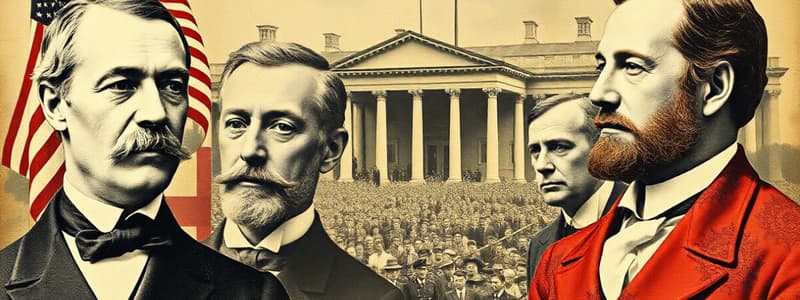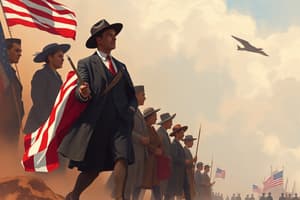Podcast
Questions and Answers
Harriet Beecher Stowe was the author of ______, a novel that depicted the realities of slavery.
Harriet Beecher Stowe was the author of ______, a novel that depicted the realities of slavery.
Uncle Tom's Cabin
William Lloyd Garrison was the leading abolitionist editor of ______, advocating for immediate abolition.
William Lloyd Garrison was the leading abolitionist editor of ______, advocating for immediate abolition.
The Liberator
Sojourner Truth was a former slave and a powerful advocate for ______ and women's rights.
Sojourner Truth was a former slave and a powerful advocate for ______ and women's rights.
racial equality
Robert E. Lee was a highly respected Confederate general known for his ______ brilliance in the early years of the Civil War.
Robert E. Lee was a highly respected Confederate general known for his ______ brilliance in the early years of the Civil War.
Ulysses S. Grant was the Union general credited with achieving victory for the Union in the ______.
Ulysses S. Grant was the Union general credited with achieving victory for the Union in the ______.
George Washington served as the first ______ of the United States.
George Washington served as the first ______ of the United States.
Thomas Jefferson is known for authoring the Declaration of ______.
Thomas Jefferson is known for authoring the Declaration of ______.
James Madison is often referred to as the 'Father of the ______.'
James Madison is often referred to as the 'Father of the ______.'
Alexander Hamilton was a key figure in the ______ Party.
Alexander Hamilton was a key figure in the ______ Party.
John Adams served as the second ______ of the United States.
John Adams served as the second ______ of the United States.
Andrew Jackson was known for significantly expanding ______ power.
Andrew Jackson was known for significantly expanding ______ power.
Abraham Lincoln guided the nation through the ______ War.
Abraham Lincoln guided the nation through the ______ War.
Frederick Douglass was a prominent ______ who advocated for the abolition of slavery.
Frederick Douglass was a prominent ______ who advocated for the abolition of slavery.
Flashcards
Who was George Washington?
Who was George Washington?
The first President of the United States, vital in establishing the nation's foundations. He led during the Revolutionary War and issued a Farewell Address warning against political factions and foreign entanglements.
Who was Thomas Jefferson?
Who was Thomas Jefferson?
The author of the Declaration of Independence and the third President of the United States. He advocated for states' rights and agrarian ideals. His presidency saw the Louisiana Purchase, significantly expanding US territory.
Who was James Madison?
Who was James Madison?
The fourth President and considered the 'Father of the Constitution'. He was crucial in drafting and advocating for the Constitution. He also played a key role in the Federalist Papers.
Who was Alexander Hamilton?
Who was Alexander Hamilton?
Signup and view all the flashcards
Who was John Adams?
Who was John Adams?
Signup and view all the flashcards
Who was Andrew Jackson?
Who was Andrew Jackson?
Signup and view all the flashcards
Who was Abraham Lincoln?
Who was Abraham Lincoln?
Signup and view all the flashcards
Who was Frederick Douglass?
Who was Frederick Douglass?
Signup and view all the flashcards
Harriet Beecher Stowe
Harriet Beecher Stowe
Signup and view all the flashcards
William Lloyd Garrison
William Lloyd Garrison
Signup and view all the flashcards
Sojourner Truth
Sojourner Truth
Signup and view all the flashcards
Robert E. Lee
Robert E. Lee
Signup and view all the flashcards
Ulysses S. Grant
Ulysses S. Grant
Signup and view all the flashcards
Study Notes
Important Figures of the New Republic to the Civil War Era
- George Washington: Served as the first President of the United States, crucial in establishing the nation's foundations. His leadership during the Revolutionary War was pivotal, and his Farewell Address warned against political factions and foreign entanglements. He exemplifies the transition from revolutionary leader to peacetime president.
- Thomas Jefferson: Third President and author of the Declaration of Independence, championed states' rights and agrarian ideals. He oversaw the Louisiana Purchase, dramatically expanding US territory. His presidency marks a significant shift in the political landscape, embodying the ideals of the Democratic-Republican Party.
- James Madison: Fourth President and "Father of the Constitution," crucial in drafting and advocating for the document. Played a key role in the early struggles of the nation, such as with the Federalist Papers. His experience shaping the nation's foundational documents is notable.
- Alexander Hamilton: Key figure in the Federalist Party, championed a strong central government. His financial policies, such as the Bank of the United States, were controversial but significantly shaped the nation's economic direction. His vision for a powerful federal government contrasted with Jeffersonian ideals.
- John Adams: Second President, facing challenges of international relations and internal divisions. He played a crucial role in the early formation of the US government and foreign policy. His presidency was marked by significant challenges.
- Andrew Jackson: Seventh President, known for his military background and popular appeal. His presidency significantly expanded executive power, and his policies towards Native Americans were controversial. He represents a shift in American politics towards greater democracy and majority rule.
- Abraham Lincoln: Sixteenth President, guiding the nation through the Civil War. His Emancipation Proclamation was a turning point in the war, and his assassination shortly after the war's end underscored its profound impact. His presidency embodies exceptional leadership in a time of extreme national division.
Key Figures of the Antebellum Period (Pre-Civil War)
- Frederick Douglass: Prominent abolitionist, former slave, and influential orator. His work exposed the horrors of slavery and advocated for its immediate abolition. He was a critical voice challenging the social and political norms of the time.
- Harriet Beecher Stowe: Author of "Uncle Tom's Cabin," a novel that vividly depicted the realities of slavery. Her work was highly influential in shaping public opinion and galvanized antislavery sentiment. She is known for leveraging literature to promote social change.
- William Lloyd Garrison: Leading abolitionist editor of The Liberator, a powerful voice for immediate abolition. His strident advocacy helped build the movement and push for social reform during the antebellum period. He championed the absolute necessity of ending slavery.
- Sojourner Truth: Former slave, powerful abolitionist, and advocate for women's rights. Her powerful speeches and activism made her a significant figure in the fight for both racial and gender equality. She was a pioneering voice in social reform.
Figures Related to the Civil War
- Robert E. Lee: Confederate general, highly respected military leader. His strategic brilliance in the early years of the war made him a formidable foe. His military leadership was key to the Confederacy's initial successes.
- Ulysses S. Grant: Union general, credited with ultimately achieving victory for the Union in the Civil War. His strategic approach, particularly in the later stages of the war, proved decisive. His military command was instrumental in the Union's eventual triumph.
- Jefferson Davis: President of the Confederate States of America. He led the Confederacy throughout the war, navigating the complex challenges of forming and governing a new nation. His leadership was key to the Confederate struggle.
- Stonewall Jackson: Confederate general, known for his tactical brilliance and aggressive leadership. His brilliant field tactics were pivotal to several Confederate victories. His aggressive leadership style was a characteristic of the war.
Studying That Suits You
Use AI to generate personalized quizzes and flashcards to suit your learning preferences.




